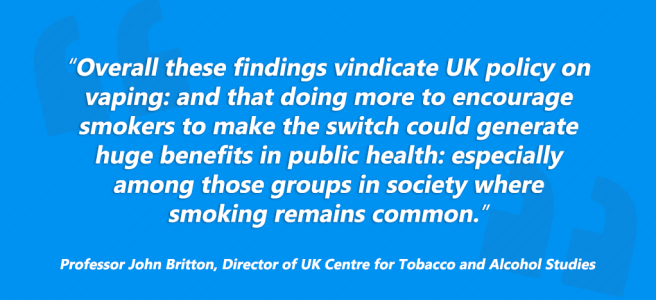Vaping helps people stop smoking – even when they don’t want to, according to new research from the University of East Anglia. A new study, funded by CRUK published today shows that smokers who switch to vaping may be better able to stay smoke-free in the long term. And that even people who didn’t want to stop smoking, have eventually quit because they found vaping more enjoyable.
Lead researcher Dr Caitlin Notley from UEA’s Norwich Medical School said: 
“E-cigarettes are at least 95 per cent less harmful than tobacco smoking, and they are now the most popular aid to quitting smoking in the UK. However the idea of using e-cigarettes to stop smoking, and particularly long-term use, remains controversial. We wanted to find out about how people use e-cigarettes to quit smoking – and whether vaping supports long-term smoking abstinence.”
The research team carried out in-depth interviews with 40 vapers. They asked them about their tobacco smoking history and prior quit attempts, and about how they started vaping, their vape set up, preferred flavours and strength, and whether they had switched to vaping in attempt to quit smoking. They also asked them about situations and experiences that caused them to relapse into tobacco smoking.
“We found that vaping may support long-term smoking abstinence,” said Dr Notley. “Not only does it substitute many of the physical, psychological, social and cultural elements of cigarette smoking, but it is pleasurable in its own right, as well as convenient and cheaper than smoking. Our study group also felt better in themselves – they noticed better respiratory function, taste and smell. But the really interesting thing we found was that vaping may also encourage people who don’t even want to stop smoking, to eventually quit.”
While most of the sample group reported long histories of tobacco smoking and multiple previous quit attempts, a minority (17 per cent) said they enjoyed smoking and had never seriously attempted to quit.
“These were our accidental quitters,” said Dr Notley. “They hadn’t intended to quit smoking and had tried vaping on a whim, or because they had been offered it by friends. They went on to like it, and only then saw it as a potential substitute for smoking.”
“Many people talked about how they saw vaping was a no pressure approach to quitting,” she added. While most of the group switched quickly and completely from smoking to vaping, some found themselves using both cigarettes and vaping, and then sliding towards stopping smoking.
“We found that people did occasionally relapse with a cigarette, mainly due to social or emotional reasons, but it didn’t necessarily lead to a full relapse. This study suggests that vaping is a viable long-term substitute for smoking, with substantial implications for tobacco harm reduction.”
Alison Cox, director of cancer prevention at Cancer Research UK, who funded the project said: “The evidence so far shows that e-cigarettes are far safer than tobacco. E-cigarettes do still contain nicotine which is addictive, but it’s not responsible for the major harms of smoking. This is why they have great potential as an aid to help people quit smoking for good. It’s great to see this early indication that e-cigarettes could encourage smokers who weren’t originally thinking of quitting to give up. But more research is needed to understand exactly how e-cigarettes are being used by people who don’t want to stop smoking and how often this results in quitting. E-cigarettes are just one option for quitting – your local Stop Smoking Service can give you free advice on the best method for you, and with their support you’ll have the best chance of success.”
###
‘The unique contribution of e-cigarettes for tobacco harm reduction in supporting smoking relapse prevention’ is published in Harm Reduction Journal on June 20, 2018.
Original article: How vaping helps even hardened smokers quit – Eurekalert










